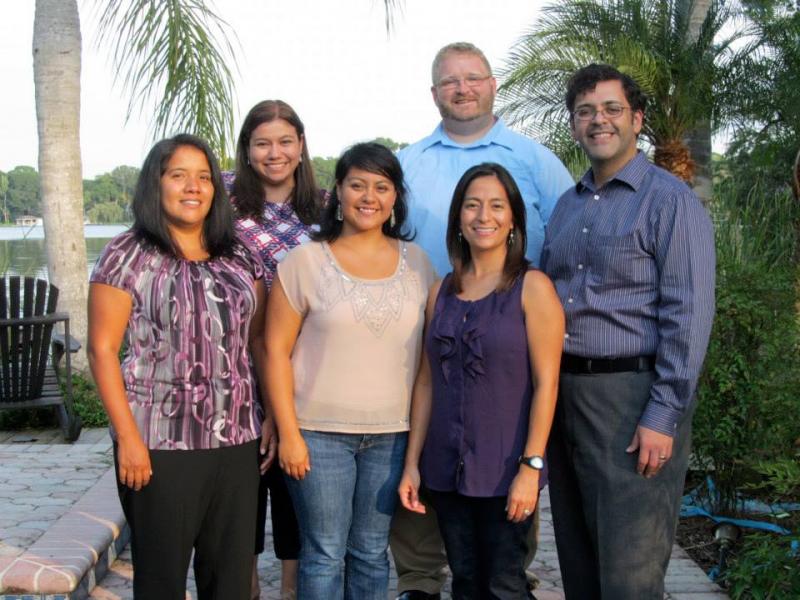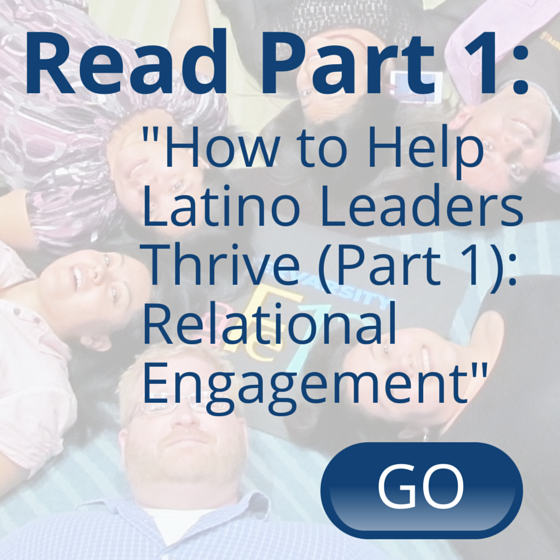
Do you want Latino leaders to thrive in your community?
In the last decade of working with Latino leaders from around the country through InterVarsity’s National LaFe Student Conference, I have learned some important leadership lessons that can help nurture and develop the next generation of Latino leaders.
In my last post, I talked about the importance of pursuing relational engagement when working with Latino leaders. Equally important to relational engagement is nurturing Latino trust.
The Priority of Nurturing Latino Trust
Latino families are very protective.
This fall I got to take my niece to college. We traveled from a small west Texas town to New York City. As I thought about advice that I would give her, I kept hearing the voices of my family:
- “Even though she is an adult, she should never walk by herself.”
- “Even though she likes her roommates, she should not leave valuables laying around her room.”
- “Even though she is over 1500 miles away, she should check in each night once she is safe at home.”
We might have heard growing up "Be careful who you trust" or "Watch out! [Blank] people might be taking advantage of you.”
So when you’re working with Latino leaders, you rarely get a blank slate.
Now don’t be discouraged. The fact that we are involved in your ministry means that you or your mission has already found a way around our protective fronts.
But we actually want to help you nurture that trust.
 Think of trust for a Latino as you would think of warm-up for an athlete. There is all this ability and potential inside, but if it is not primed for performance, your results will not be the best or consistent. There are common ways to build trust as well as tailored pieces for each Latino. Ultimately you will not only get stronger productivity but will also have begun the journey towards loyalty.
Think of trust for a Latino as you would think of warm-up for an athlete. There is all this ability and potential inside, but if it is not primed for performance, your results will not be the best or consistent. There are common ways to build trust as well as tailored pieces for each Latino. Ultimately you will not only get stronger productivity but will also have begun the journey towards loyalty.
What you need to know to nurture Latino trust
- We adapt. We prefer to have a more casual regard to time but have learned to follow a strict schedule and that start times are really important. We prefer to work in a harmonious environment but have learned that the bottom line is a very important factor when evaluating projects. So there are probably a handful of situations where we are already adapting to your or the organization’s values.
- We have experienced rejection. Our ideas or perspective are different when it comes to group dynamics. However they are considered cumbersome, complex or unrealistic. We respect senior leadership by listening first and waiting to give our opinion but are seen as hesitant or disengaged. We are constantly trying to figure out which values might be accepted or welcomed in new situations or teams.
- We have chosen to stay. The mission and purpose of the group drives our commitment. We believe in this work. We personally know the affect it can have in someone’s life and want them to experience all the things that we have experienced. So even though we have to adapt and experience rejection, it is worth it for the sake of the mission.
We might have heard growing up "Be careful who you trust" or "Watch out! [Blank] people might be taking advantage of you.” So when you are working with Latinos, you rarely get a blank slate.
Remember this about us: we are often asking "Can I be myself? How do I need to adapt? Is this a safe environment?"
Do you know how you want us to answer those questions?
Leadership Challenge: Don't assume that Latino friendliness or hospitality means there is trust. Intentionally nurture trust.
4 Ways to Nurture Latino Trust
- Shift relationships forward. Often in American culture, you take care of business and then you socialize, i.e., happy hour or golf on Friday. Relationship is something that comes at the end of work. But in Latino culture relationship serves as a catalyst for the work, not a reward from the work. It is crucial to make space at the beginning of meetings to connect relationally before getting down to business.
- Pay attention. Ask about our families. Meet them if you can. Remember what we share. Follow up with us when we share about difficult or significant family situations. Deep engagement goes a long way.
- Show – don’t just say – that you value us. Invest in us as leaders. Develop our strengths and offer your insights for improvement and advancement. As a leader in our lives, the trust we’ve already given you gives you tremendous influence.
- Allow us to shine. Invite us to lead in areas where we’re strong. Share our ideas and give us credit. Showing that you trust us helps us trust you.
As you build trust with us, we will be able to navigate complex and challenging situations together.
We need you to lead us well. We need to trust you. And we want to too.
"How to Help Latino Leaders Thrive (Part 1): Relational Engagement"